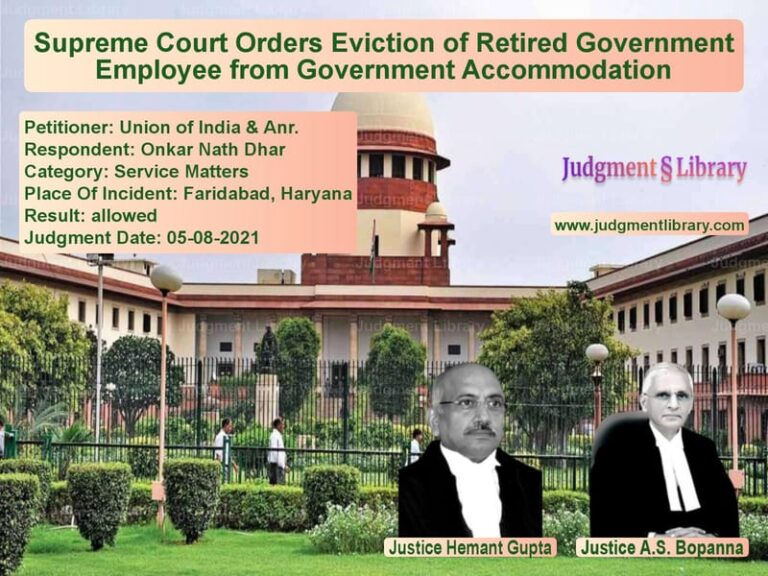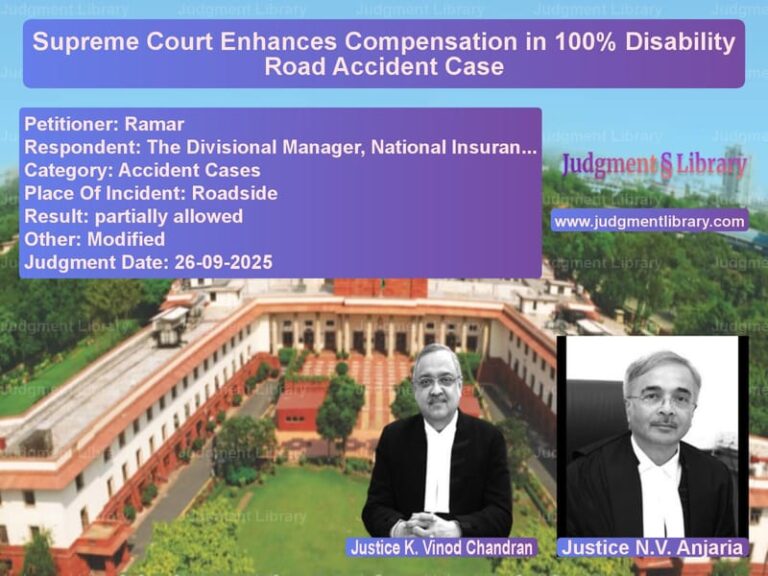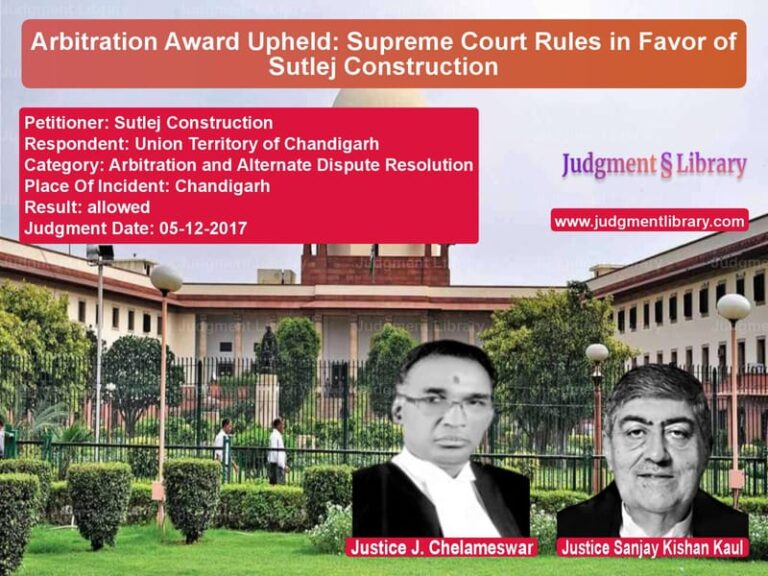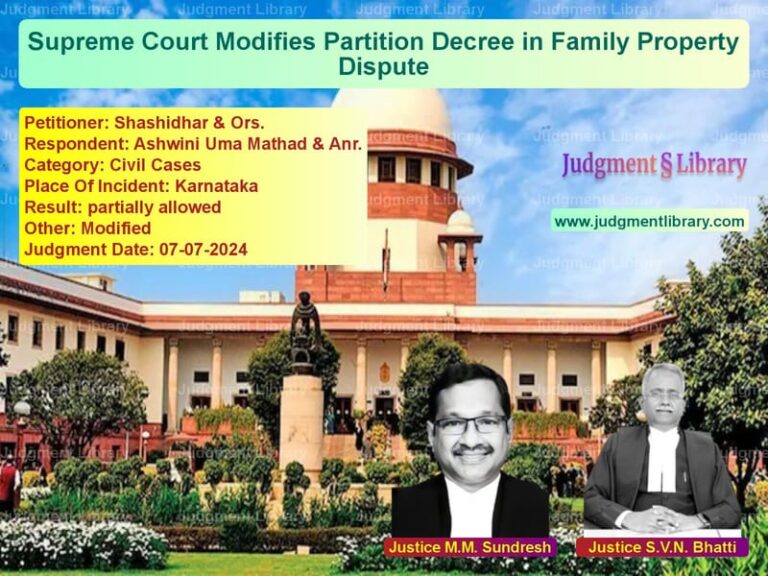Legal Implications of Filing a Second Complaint After a Final Report: Supreme Court Ruling Explained
The Supreme Court of India recently addressed a crucial legal question regarding the maintainability of a second complaint after the acceptance of a negative Final Report. The case involved Subrata Choudhury @ Santosh Choudhury & Ors. (Appellants) versus The State of Assam & Anr. (Respondents). The judgment was delivered on November 5, 2024, by a bench comprising C.T. Ravikumar and Rajesh Bindal.
The core issue revolved around whether a fresh complaint based on the same facts is permissible after the court has already accepted a negative Final Report under Section 173 of the Code of Criminal Procedure (Cr.P.C.). The case originated from a complaint filed on November 11, 2010, before the Chief Judicial Magistrate (CJM), Cachar, Silchar, which was later investigated and concluded with a negative Final Report on February 28, 2011. The complainant challenged this report, but the court upheld its findings and dismissed the complaint.
Background of the Case
The complainant alleged offenses under Sections 406 and 420 read with Section 34 of the Indian Penal Code (IPC). Upon investigation, the police filed a Final Report, concluding that no case was made out. The complainant then filed a written objection (narazi petition) against the report, arguing that the investigation was flawed. However, on June 6, 2011, the CJM accepted the Final Report, rejecting the objection.
Subsequently, on July 20, 2011, the complainant filed a second complaint on the same facts, which the CJM dismissed as not maintainable. This dismissal was challenged before the Additional Sessions Judge, who set aside the CJM’s order and directed reconsideration of the case. The High Court of Gauhati upheld this decision, leading the appellants to approach the Supreme Court.
Supreme Court’s Legal Analysis
The appellants argued that the second complaint was not maintainable as it was based on the same allegations that had already been investigated and closed by a competent court. They relied on Section 300(1) of the Cr.P.C., which states:
“A person who has once been tried by a Court of competent jurisdiction for an offense and convicted or acquitted of such offense shall, while such conviction or acquittal remains in force, not be liable to be tried again for the same offense.”
The court examined whether this provision applied to the present case and concluded that since the appellants had never been tried or acquitted, Section 300(1) was not applicable.
Judicial Precedents Considered
The Supreme Court referred to various judgments to determine the conditions under which a second complaint can be entertained:
- Pramatha Nath Talukdar v. Saroj Ranjan Sarkar: A second complaint can be entertained in exceptional cases, such as when the previous order was based on incomplete records or a misunderstanding of the complaint.
- Bhagwat Singh v. Commissioner of Police: A magistrate has four options upon receiving a negative report—accept it, order further investigation, conduct an independent inquiry, or treat it as a private complaint.
- Samta Naidu v. State of Madhya Pradesh: A second complaint is not maintainable if it raises the same core issues as the first complaint.
Final Ruling and Its Impact
The Supreme Court held that the second complaint was identical to the first and did not introduce any new facts or circumstances. The complainant had already challenged the Final Report, and the matter had been adjudicated. Therefore, the court ruled that:
“A repeated complaint by a frustrated litigant cannot be maintained. The second complaint, being a mere reproduction of the first, is not maintainable.”
As a result, the court allowed the appeal, set aside the High Court’s order, and reinstated the CJM’s original dismissal of the second complaint.
Conclusion
This judgment clarifies that while a second complaint is not automatically barred, it must present new facts or exceptional circumstances to be maintainable. Otherwise, it would lead to unnecessary judicial harassment and procedural abuse. The ruling reinforces the principle that once a case has been judicially settled, it cannot be reopened merely to suit a litigant’s dissatisfaction.
Petitioner Name: Subrata Choudhury @ Santosh Choudhury & Ors..Respondent Name: The State of Assam & Anr..Judgment By: Justice C.T. Ravikumar, Justice Rajesh Bindal.Place Of Incident: Cachar, Silchar, Assam.Judgment Date: 05-11-2024.
Don’t miss out on the full details! Download the complete judgment in PDF format below and gain valuable insights instantly!
Download Judgment: subrata-choudhury-@-vs-the-state-of-assam-&-supreme-court-of-india-judgment-dated-05-11-2024.pdf
Directly Download Judgment: Directly download this Judgment
See all petitions in Bail and Anticipatory Bail
See all petitions in Fraud and Forgery
See all petitions in Judgment by C.T. Ravikumar
See all petitions in Judgment by Rajesh Bindal
See all petitions in allowed
See all petitions in supreme court of India judgments November 2024
See all petitions in 2024 judgments
See all posts in Criminal Cases Category
See all allowed petitions in Criminal Cases Category
See all Dismissed petitions in Criminal Cases Category
See all partially allowed petitions in Criminal Cases Category







